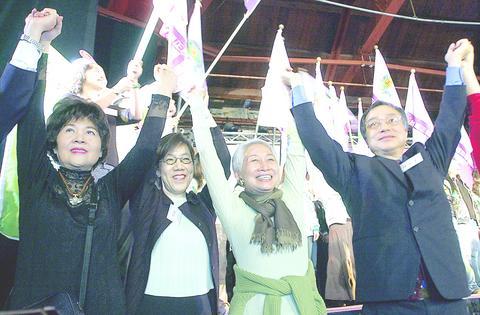The chief organizer of the human-chain rally that is slated to take place on Feb. 28 announced yesterday that the event has so far received overwhelming support nationwide, with the number of scheduled participants exceeding 1 million.
Democratic Progressive Party (DPP) Deputy Secretary General Lee Ying-yuan (

PHOTO: SEAN CHAO, TAIPEI TIMES
Giving a report on the progress of the rally, Lee said the quick surge in the number of participants has cheered the morale of the organizers, but has also made transporting the throng of participants an acute problem.
Lee said there are about 9,000 buses available in the country, but even that number would be insufficient to carry all of the participants.
"We hope people can use all kinds of transport, including bicycles, motorcycles, cars or even walking to support the activity," Lee said.
Supporters of the rally, which is being jointly organized by the DPP, Taiwan Solidarity Union and hundreds of private groups advocating Taiwanese independence gathered yesterday in Taipei to appeal for lasting peace, freedom and democracy and to oppose China's aiming of missiles at Taiwan.
Annie Lee (
She said the Chinese Nationalist Party (KMT) in the past five decades has educated people to believe many things that are irrelevant to the well-being of Taiwan, including asking people here to retake China, to build a prosperous China and to liberate the Chinese people living in dire conditions under the rule of the communist party.
"But these demands are irrelevant, vague and unreal to us. To many of us here, the idea of China -- this so-called motherland -- is very vague, and we don't know what it looks like. What is real to us is the land that we stand on and live in. That is what we care about," Lee said.
She said the event aims to invite people to redefine their national identity, to demand China respect Taiwanese people's will and to let the world understand that the people of Taiwan are not the pawns of the Chinese.
Urging more people to attend the rally and to write a new chapter in Taiwan's democracy, Lee reminded supporters to bring three gadgets with them on the day of the rally: cellphones, digital cameras and radios.
The rally will span 500km in length along the north-south provincial highways on the west coast, from Keelung County to Pingtung County. All participants are expected to hold hands at 2:28pm on Feb. 28.
Participants are encouraged to use cellphones to spread text messages about the event, while the digital cameras will be used to keep photographic records which will then be published online to be viewed worldwide. Information regarding the rally will also be broadcast on the radio.
National Policy Adiser Alice King (
"Eighty-five percent of Japanese agree that Taiwan's remaining a democratic and free country and not becoming a part of China are very important to Japan. Japanese are actually more concerned about whether Taiwan could insist on walking its own road and not be swallowed by China. Because if that happens, Chinese naval power can penetrate the Western Pacific, which would endanger Japan's security," King said.

RESILIENCE: Deepening bilateral cooperation would extend the peace sustained over the 45 years since the Taiwan Relations Act, Greene said Taiwan-US relations are built on deep economic ties and shared values, American Institute in Taiwan (AIT) Director Raymond Greene said yesterday, adding that strengthening supply chain security in critical industries, enhancing societal resilience through cooperation and deepening partnerships are key to ensuring peace and stability for Taiwan in the years ahead. Greene made the remarks at the National Security Youth Forum, organized by National Taiwan University’s National Security and Strategy Studies Institution in Taipei. In his address in Mandarin Chinese, Greene said the Taiwan-US relationship is built on deep economic ties and shared interests, and grows stronger through the enduring friendship between

GAINING STEAM: The scheme initially failed to gather much attention, with only 188 cards issued in its first year, but gained popularity amid the COVID-19 pandemic Applications for the Employment Gold Card have increased in the past few years, with the card having been issued to a total of 13,191 people from 101 countries since its introduction in 2018, the National Development Council (NDC) said yesterday. Those who have received the card have included celebrities, such as former NBA star Dwight Howard and Australian-South Korean cheerleader Dahye Lee, the NDC said. The four-in-one Employment Gold Card combines a work permit, resident visa, Alien Resident Certificate (ARC) and re-entry permit. It was first introduced in February 2018 through the Act Governing Recruitment and Employment of Foreign Professionals (外國專業人才延攬及雇用法),

The Ministry of Transportation and Communications yesterday said that it would redesign the written portion of the driver’s license exam to make it more rigorous. “We hope that the exam can assess drivers’ understanding of traffic rules, particularly those who take the driver’s license test for the first time. In the past, drivers only needed to cram a book of test questions to pass the written exam,” Minister of Transportation and Communications Chen Shih-kai (陳世凱) told a news conference at the Taoyuan Motor Vehicle Office. “In the future, they would not be able to pass the test unless they study traffic regulations

‘COMING MENACINGLY’: The CDC advised wearing a mask when visiting hospitals or long-term care centers, on public transportation and in crowded indoor venues Hospital visits for COVID-19 last week increased by 113 percent to 41,402, the Centers for Disease Control (CDC) said yesterday, as it encouraged people to wear a mask in three public settings to prevent infection. CDC Epidemic Intelligence Center Deputy Director Lee Chia-lin (李佳琳) said weekly hospital visits for COVID-19 have been increasing for seven consecutive weeks, and 102 severe COVID-19 cases and 19 deaths were confirmed last week, both the highest weekly numbers this year. CDC physician Lee Tsung-han (李宗翰) said the youngest person hospitalized due to the disease this year was reported last week, a one-month-old baby, who does not